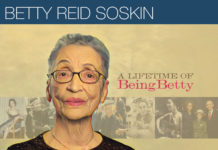
A review of TheatreFirst and Shotgun Players’ co-production of ‘Far, Far Better Things’ by Geetha Reddy, directed by Katja Rivera
by Wanda Sabir
It is easy to become what you know, so easy. What’s difficult is resisting. Unresolved trauma haunts the gene pool. A son, Josh (actor Yohana Ansari-Thomas) witnesses his mother’s murder or its aftermath – Dad’s bloody shirt and subsequent kidnapping of the children until he is captured. This same boy, now man, still has unresolved memories of that day when his mom was shot and the housekeeper “stood there and did nothing.”
He is angry to find this same woman once again in their family home, this time taking care of his niece, his sister, Zoe, now a doctor’s daughter. He becomes his father – he rapes the woman’s child, then calls his friend who works for immigration and reports his former nanny.
Pilar (Michelle Navarrete) didn’t protect him. She ruined his life, so now he’s going to ruin hers and her child’s too. As he turns into his father, does Zoe turn into her mother? From the crypt we hear the voice of the activist in published videos. One wonders what she suffered to die so brutally. What was going on in her house?
The late Lali Putri (Radhika Rao) was a human rights activist whose work centered on women’s rights. She founded a shelter for immigrant women who were fleeing spousal or partner abuse. The housekeeper-friend (Pilar) finds shelter there and support. The two women make plans together to expand services. Pilar is going to go to law school. As the younger immigrant woman grows into her womanhood, she gains confidence, an attitude reflected later in her daughter’s personality.
Dani (actress Neiry Rojo) is no wimp. She is the kind of young woman who is not afraid to speak the truth. She gives her mother tools to confront these adults she used to take care of. Pilar’s daughter, who is reading Charles Dickens’ “Tale of Two Cities,” critiques the author’s portrayal of women as appendices of men without agency or freewill. She says he intentionally crafts these weak, mono-dimensional female characters despite Mary Wollstonecraft’s work, which stands in opposition to British contemporary male writers whose work furthers patriarchal propaganda.
There is a beautiful moment when Pilar confronts her employer, Zoe (Kimiya Shokri). She demands compensation for all the times Zoe has come home late and then pays Pilar her salary late too. Fed up, Pilar tells Zoe she has been keeping track and shows her a quilt she has knitted – stories sewn into the cloth. The yellow flower is the gun she finds.
When Pilar’s daughter is harmed, she picks up the gun as brother and sister watch her nervously as she paces and talks – weapon in her hands. In “Far Far Better Things,” the abuse doesn’t stop until every woman on stage has experienced rape – and then the pain body takes on a life of its own as the three women (one a ghost) juggle single parenting with work.
The playwright says she started writing this play as an adaptation of “A Tale of Two Cities” during the summer of 2016. However, at the same time, she writes in the program notes that she was also thinking about frogs in boiling water. “‘Far, Far Better Things’ was written from inside that pot looking up at the lid closing over her head and thinking, ‘Hey, what happened to the sun?’”
The two cities are multiple Americas. Both the doctor and her brother and their servant are immigrants. A Latina, Pilar just does not have citizenship papers. She says her parents rode the bus and walked across the border into America. She was two and her mother carried her most of the way. Zoe and Josh’s South Asian parents were not poor or uneducated. Legal immigrants, they have not had to worry about deportation. The economics of the situation make these two families seem different, yet they are so similar. “Far, Far Better” shows what is better for one person is fairer if available to all persons.
Dickens was a class driven writer. He cared about the use of child labor in the factories. He took moral stands on economic inequalities and exploitation of the poor by the rich. “Far Far Better” tells a similar story of exploitation. Zoe is her mother Lali Putri’s daughter. Will she get it right too?
The acting in this tense play is superb. The way the three women, the dead mother and the two living ones parent is so different. Pilar at one point tells Zoe how her mother helped her figure out how to be a mother. Questions she would have asked her mother, she asked Lali Putri. Pilar’s experience is Lali Putri is not what Zoe remembers of her mother. Zoe seems angry when she thinks of her. Perhaps her mother gave away too much and had nothing left for her own children?
Pilar offers what she has learned with the new mother. Zoe is not interested. When the two women meet as adults the first time, Zoe lets her 2-week-old child cry herself to sleep. In contrast, it is sweet to see how affectionate Pilar is with Dani, who allows her mother to hug and kiss her, even lie in the bed with her close.
This intimacy is also reflected in the set design – a living room with a small kitchen, door to outside where we see Pilar and Dani’s tinier space: a chair. The baby grows bigger too. Light projected into the space when darkened between scenes adds a sci-fic ethereal look to the space especially when the disembodied fourth woman, whose portrait sits on the table near the door speaks. Her face is often too large for the room to hold. Is the table near the door an altar?
Both Pilar and Zoe consult Radhika Rao’s Lali Putri, especially when Dani shares online links. Is Rao live or is her Lali Putri really a projection? Her energy is omnipresent, her will omnipotent.
This play closes the company’s wonderful 2018-19 TheatreFirst Season, which featured, if I am not mistaken, all new work. To learn more about what’s coming up next, visit theatrefirst.com.
Bay View Arts Editor Wanda Sabir can be reached at wanda@wandaspicks.com. Visit her website at www.wandaspicks.com throughout the month for updates to Wanda’s Picks, her blog, photos and Wanda’s Picks Radio. Her shows are streamed live Wednesdays and Fridays at 8 a.m., can be heard by phone at 347-237-4610 and are archived at http://www.blogtalkradio.com/wandas-picks.

 Store
Store












